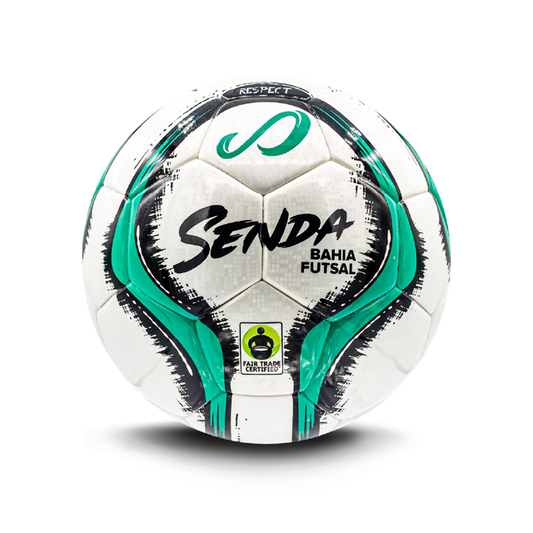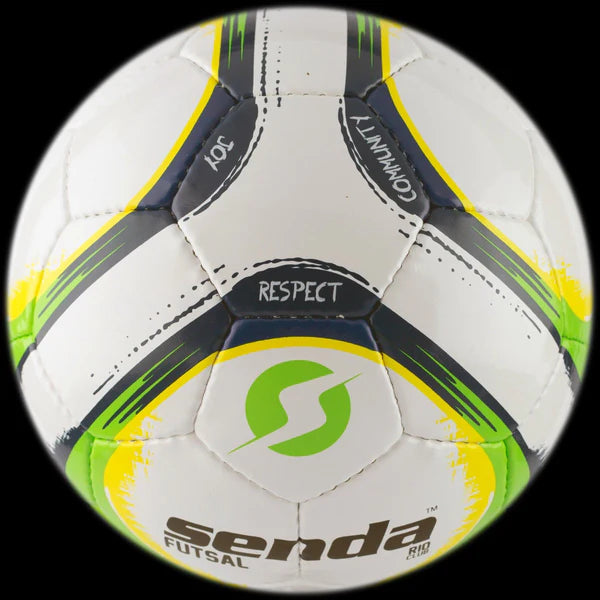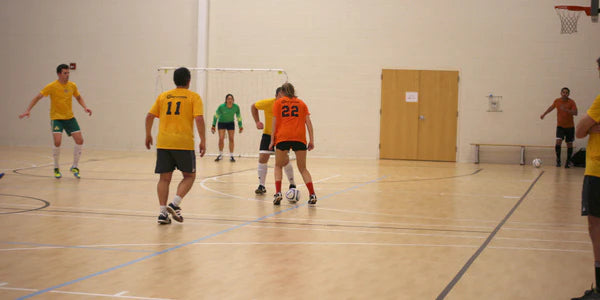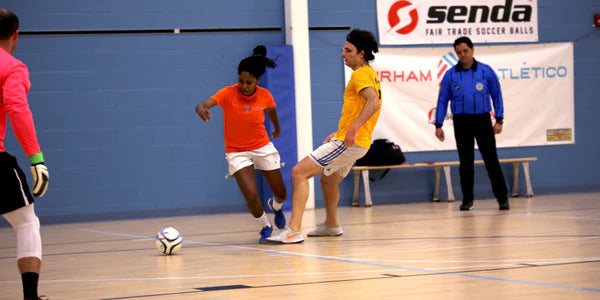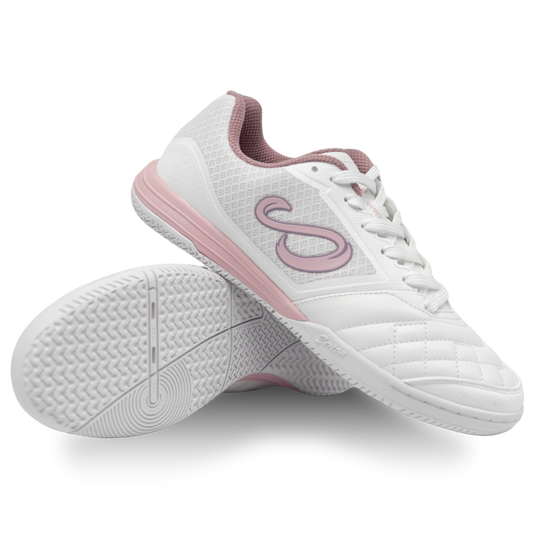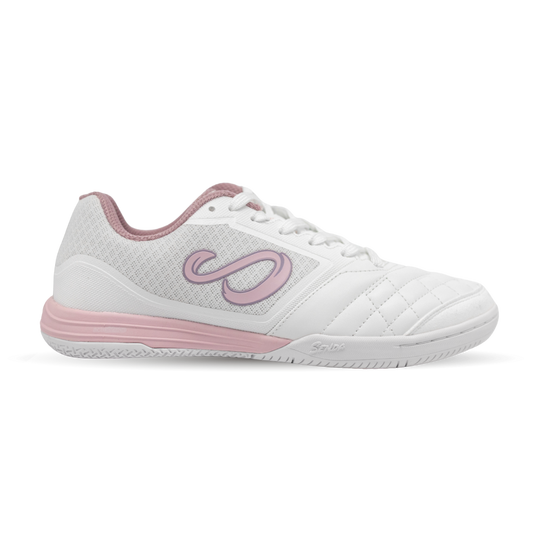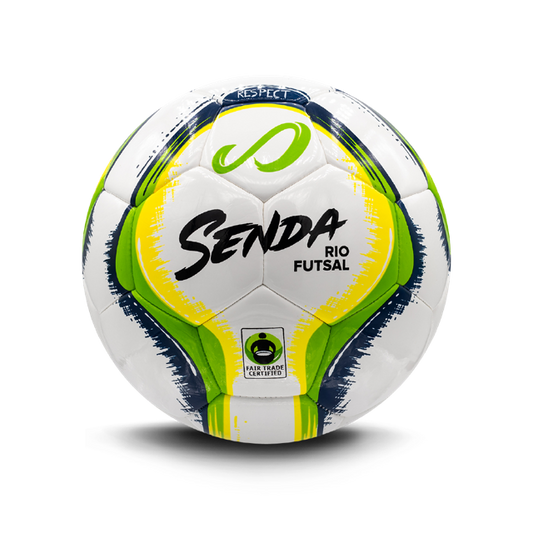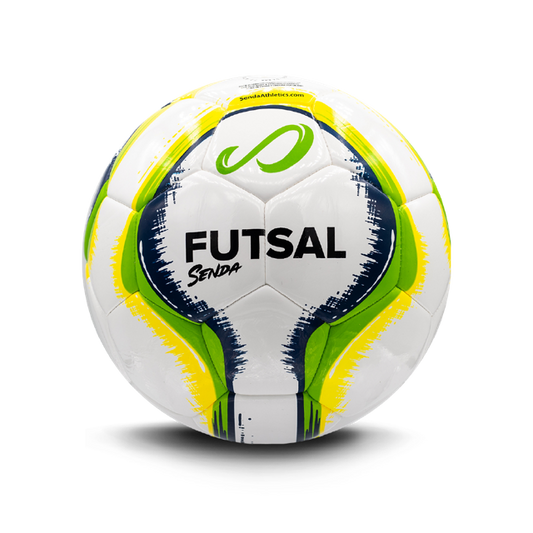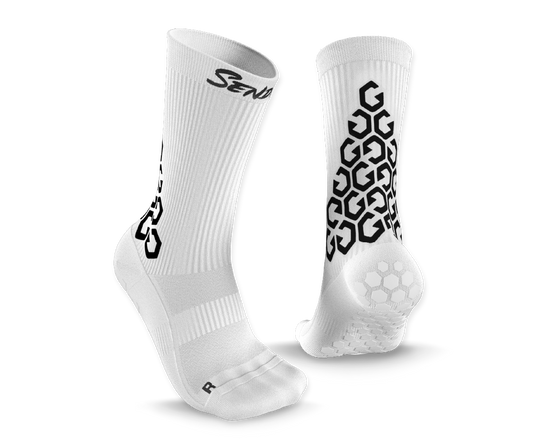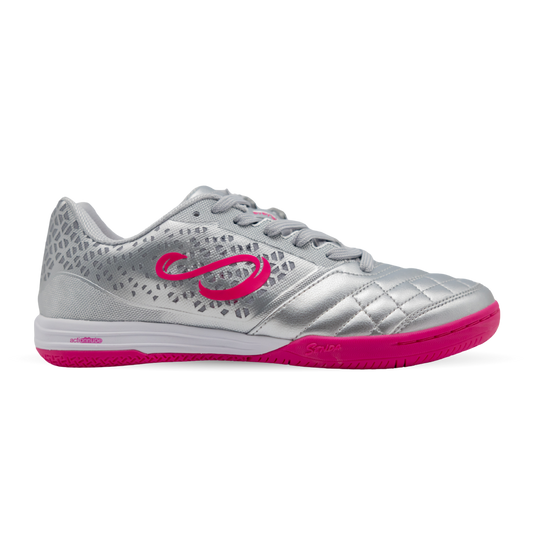SHARING SOCCER AND COMMUNITY, SENDA DEBUTS FUTSAL BALLS WITH DURHAM ATLÉTICO
Soccer is a sport, but it’s more than that. It’s an opportunity to bring together people of different cultures, nationalities, languages and socioeconomic backgrounds in a shared spirit of community and competition. These are people who might not otherwise cross paths, but as players they overlap, link up and combine on the field or court and grow relationships after the whistle.San Francisco Bay area-based Senda Athletics and Durham Atlético not only understand that potential, both organizations were founded on it. That makes Senda Fair Trade USA-certified balls the natural choice for the growing adult futsal league.Senda founder Santiago Halty brought the brand’s new 2016 line to the Levin JCC on match day to give DA players the chance to be among the first to play with them in competition.
1
/
of
2
The Senda Victoria Match Ball and Senda Rio Club Ball each feature the words “community,” “joy,” and “respect” to show the brand’s values, says Santiago Halty, Senda’s CEO and founder.“We hope that when people are playing and the game gets a little heated you look down and you see that written small and you’re like, ‘That’s right, I play for joy. I’m a part of the community. I should have respect for my teammates and the referee when there are a couple of bad calls,’” he says.
They also feature a handpainted design to represent futsal and soccer as an art form. “The idea is that as you are playing and you get a new mark, instead of being a scratch that makes the ball look bad it adds to the story of how the ball is being used,” Halty says.
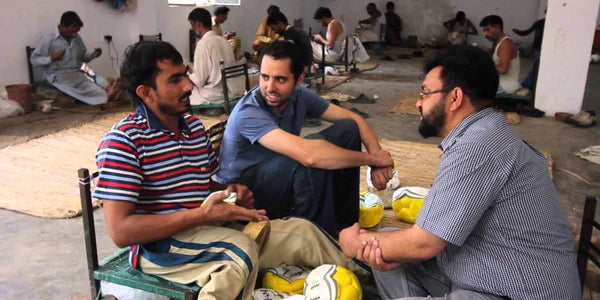
GIVING BACK TO THE GAME
Halty, who hails from Buenos Aires, Argentina started Senda’s path in 2010 as a recent the University of California-San Diego graduate. After finding the soccer field as his comfort zone and way to connect with others while away from home, Halty sought to create balls and gear that provides the same sort of opportunity for those who produce it.
He located a factory in Pakistan, where 70 percent of the world’s balls are made, with workers who are given a living wage in suitable conditions to craft products by hand. Senda pays a Fair Trade premium, meaning 10 percent of the cost of each ball goes toward a community fund that workers can use for commodities like tea, oil, sugar, beans, backpacks, and glasses. The balls not only give back in Pakistan, but in the United States through the partnership with nonprofits like Street Soccer USA, which supports homeless players, Soccer Without Borders and its mission to help underserved refugee and immigrant youth, and the Bay Area Outreach Program (BORP) wheelchair power soccer program. Senda provides contributions to all three partners via the 1% For the Game Initiative, their commitment to take that percentage of annual sales and donate them in gear.
Similarly, Durham Atlético archtects and incubators David Fellerath and Kosta Harlan began their league as a means to connect the Bull City’s diverse residents and “return soccer to its roots.” They turned to futsal because of a lack of available urban field space. Their league fees go to support retrofitting fields with new goals, nets and the needed upkeep and, ultimately, create new ones. “We really came at this with a goal of creating a space for people of all social backgrounds to play soccer,” Fellerath says. “Then when it came time to choose what ball we would use for our league, the fact that Senda manufactures Fair Trade balls caught our eye because Fair Trade to us indicates that this is a manufacturer that cares about its product, cares about the conditions of the factory where the product comes from and is trying to operate in a soccer ecosystem where everyone shares equally in the joys and the benefits of soccer.” Halty said he’s “really humbled,” that DA chose Senda and that it “shows that we are getting traction with like-minded people.” “We need to start working with more groups that are looking at soccer as a way to do more than just provide leisure time.”
PERFORMING AT ELITE LEVEL
Futsal is the most rapidly growing format of soccer in the United States. The 5v5 set-up not only serves as an ideal way to play in winter months, but is a faster game with more touches on the ball for each player. U.S. Soccer is promoting it as a means for more technical skill development, following what’s also standard practice in Halty’s home country where Lionel Messi grew up playing small-sided. It’s spreading if Durham Atlético provides any kind of a case study. In just 14 months, they’ve gone from 60 players and six teams to a two-division format including 160 futsalers ranging from teenagers to 50-year-old competitors on 16 squads.
The Durham Atlético matches, while friendly, can be intense. Among the growing rosters are former futsal professionals and accomplished players like Mollie Pathman, a member of the NWSL’s Boston Breakers and 2010 Gatorade National High School Player of the Year. Futsal provides a new challenge for her, she says, with less running and more demand to beat players 1v1 with ball skill. “You see the really savvy soccer players and you are able to pick them out from those who could survive in a 11v11 game,” says Pathman, who suits up for MVFC.
1
/
of
2
Pathman’s Duke women’s soccer teammate Natashi Anasi also plays for MVFC. She was twice a NSCAA All-America, just the second Blue Devil to achieve the feat, and now a professional with IBV of Iceland. Leagues and players choose Senda not just for the feel good story, but also for performance. We dissected Senda balls in 2015 to show what makes them elite. They meet the standards of the U.S. Youth Futsal Association, who use them for regional and national matches. They are low bounce with a synthetic leather cover for control in tight spaces. Both Pathman and Anasi said they impressed with the new Senda line and the connection between the brand and the league. “The weight of the ball actually was a little less heavy but it was really comfortable to play with,” Anasi said. “You could get a really pure strike and you could also move the ball and get really good control of it.” Added Pathman, “There’s good cushioning on the ball and I think it helped everyone’s touch today.” “Their mission is the fun of the game, which is why we’re all out here playing win or lose,” she said. “We’re just trying to have a good time and learn more about futsal. It’s a nice reminder to see on the ball.”
You can also find this blog post at SOCCER.COM
Learn more about Durham Atlético at www.durhamatletico.com
What do you think of the words “community,” “Joy” and “respect” on Senda’s futsal balls? What other terms represent your soccer values? Let us know in the comments section.
You may also like
-
Ushuaia Club 2.0 Futsal Shoe
4.54 / 5.0
(13) 13 total reviews
Regular price From $59.99Regular priceUnit price / per$59.99Sale price From $59.99 -
Rio Match Futsal Ball
5.0 / 5.0
(1) 1 total reviews
Regular price $34.99Regular priceUnit price / per$34.99Sale price $34.99 -
Gravity Pro Crew Length
4.5 / 5.0
(10) 10 total reviews
Regular price $24.99Regular priceUnit price / per$24.99Sale price $24.99 -
Ushuaia Pro 2.0 Futsal Shoe
4.8 / 5.0
(5) 5 total reviews
Regular price $119.99Regular priceUnit price / per$119.99Sale price $119.99
Other Blog Notes
View all-

Senda Becomes the Third Futsal Footwear Brand at the First FIFA Women’s Futsal World Cup
At the first-ever FIFA Women’s Futsal World Cup, Senda reached a historic milestone—becoming the third futsal footwear brand worn on court and reinforcing its commitment to the growth of the women’s game worldwide.
Senda Becomes the Third Futsal Footwear Brand at the First FIFA Women’s Futsal World Cup
At the first-ever FIFA Women’s Futsal World Cup, Senda reached a historic milestone—becoming the third futsal footwear brand worn on court and reinforcing its commitment to the growth of the women’s game worldwide.
-

Ushuaia Pro 2.0 Futsal Shoes: New Orange & Silver Color Drops Are Here
The Ushuaia Pro 2.0 Futsal Shoe arrives in new Orange and Silver colorways, combining elite indoor performance, advanced traction, and bold modern style—built for the intensity of futsal.
Ushuaia Pro 2.0 Futsal Shoes: New Orange & Silver Color Drops Are Here
The Ushuaia Pro 2.0 Futsal Shoe arrives in new Orange and Silver colorways, combining elite indoor performance, advanced traction, and bold modern style—built for the intensity of futsal.
-
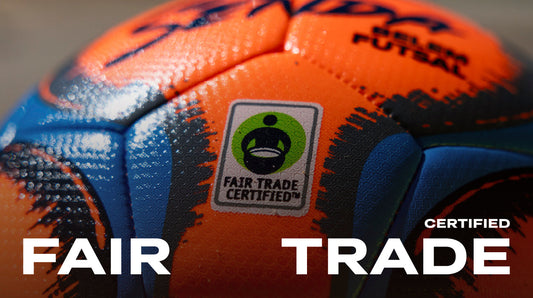
Celebrating Fair Trade Month with Senda
This October, Senda celebrates Fair Trade Month by honoring the people behind every ball. Discover how Fair Trade creates impact on and off the field.
Celebrating Fair Trade Month with Senda
This October, Senda celebrates Fair Trade Month by honoring the people behind every ball. Discover how Fair Trade creates impact on and off the field.
1
/
of
3

